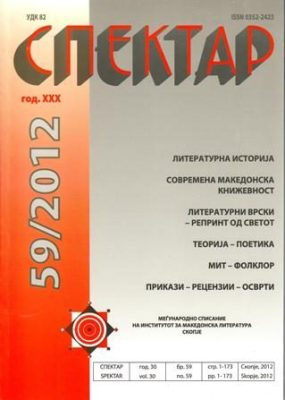ЗА КУЛТУРНАТА МЕМОРИЈА (проста и строга македонска песна и португалско фадо)
ON CULTURAL MEMORY (simple and compact Macedonian poetry and Portuguese fado)
Author(s): Vesna Mojsova-ČepiševskaSubject(s): Poetry, Comparative Study of Literature, Macedonian Literature
Published by: Институт за македонска литература
Keywords: simple and compact Macedonian poetry; Portuguese fado; original; cultural memory
Summary/Abstract: The short phrase simple and compact Macedonian poetry taken from Blaze Koneski`s renowned poem Vezilka has become a 'symbol' in itself of contemporary Macedonian poetry as a whole. The first part alludes to the simplicity of poetic expression (according to Juri Lothman, a consequence of acquired complexity, not because it is preceded by it, but rather because it occurs in its fon). The second part of the phrase suggests the poet`s rational control and self-awareness in the creative process. Both options ñ the simple (basic) and the celestial (heavenly/compact) seen as two extremes/oppositions intertwine and create the characteristic, unique Macedonian poetry. On the other hand, the fado, a Portuguese music genre, is a deep expression of the Portuguese sensibility and as such has become the symbol of Portuguese destiny for over 200 years. We can see that the fado, which starts out as a popular marginal song and then turns into a folk song characterized by mournful nostalgic feelings, as well as irony and sarcasm (the guitar tunes and voice), has a close connection with the simple and compact Macedonian poetry (the music of the lute and the voice). This text will attempt to answer the following questions: Should we not recognize in the simple and compact Macedonian poem, as well as in the Portuguese fado, the avant-garde poetry of point zero which shapes the world and culture with the faith in the real world ñ in the original? Do the poems of the great poets such as Petre M. Andreevski from Macedonia and Vasco Graca Moura from Portugal (the recipient of the Golden Wreath of Poetry in the internationally acclaimed Struga Poetry Evenings) reveal the nostalgia for the original, as well as play around with the cracks in/from that original, building on this idea of the cultural memory of the simple and compact Macedonian poetry, i.e., the Portuguese fado?
Journal: Спектар
- Issue Year: 2012
- Issue No: 59
- Page Range: 104-110
- Page Count: 7
- Language: Macedonian

